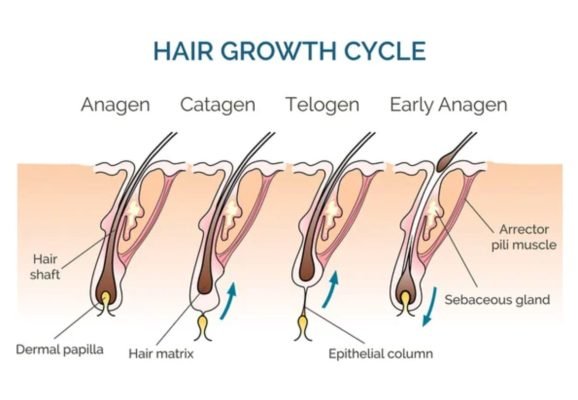Why is My Hair Falling Out? Causes of Hair Loss in Men
Hair loss is a common concern among men, often leading to feelings of insecurity and frustration. If you’ve noticed thinning hair or a receding hairline, you may be asking yourself, “Why would my hair be falling out?” Understanding the causes of hair falling out can help you find the right hair growth treatment and regain confidence. In this article, we’ll explore various hair loss causes and effective solutions.
Understanding Hair Loss
Before diving into the specifics, it’s important to understand how hair grows. The hair growth cycle consists of three main phases:
- Anagen phase: This is the active growth phase, lasting several years.
- Catagen phase: This transitional phase lasts a few weeks, during which hair growth slows down.
- Telogen phase: In this resting phase, hair can shed and eventually fall out, making room for new growth.
Types of Hair Loss
Hair loss can manifest in various forms, each with its own causes and characteristics. Recognizing the specific factors for hair loss is crucial for determining the appropriate treatment and management strategies. Below, we will describe the most common types of hair loss.
Androgenetic Alopecia
Androgenetic alopecia, commonly known as male pattern baldness, is the most prevalent form of hair loss in men. It affects up to 70% of the male population at some point in their lives and it is genetically inherited. The hallmark signs of this condition include thinning at the crown, where hair begins to recede, as well as a gradually moving hairline that forms an “M” shape. Over time, men may notice an overall reduction in hair density, leading to more exposed scalp.
Telogen Effluvium
Telogen effluvium is a temporary type of hair loss that often occurs in response to stress, trauma or hormonal changes. This condition typically results in widespread shedding of hair, making it different from male pattern baldness. Men experiencing telogen effluvium may notice sudden hair loss occurring several months after a stressful event, such as surgery, illness, or significant life changes. Unlike localized hair loss, telogen effluvium often causes thinning across the entire scalp.
Alopecia Areata
Alopecia areata is an autoimmune disorder where the immune system mistakenly attacks hair follicles, leading to sudden hair loss. The most recognizable signs of alopecia areata include circular bald patches on the scalp, face or other body areas. Some people may also observe changes in hair texture, with hairs becoming thinner or white before they fall out.
Traction Alopecia
Traction alopecia results from prolonged tension on the hair due to tight hairstyles such as ponytails, braids or extensions. The primary signs of this condition include localized thinning around the temples or the front of the scalp. Some people also notice bumps or signs of inflammation in the affected areas, which may also feel sensitive to touch.
Scarring Alopecia
Scarring alopecia is characterized by inflammation that destroys hair follicles, replacing them with scar tissue. The signs to recognize this type of hair loss include a smooth, shiny appearance of the scalp where hair has been lost. There may also be signs of redness and inflammation. Unlike other forms of hair loss, scarring alopecia typically results in irreversible loss of hair in the affected areas.
Common Causes of Hair Loss in Men
Understanding the reasons for losing hair is crucial for addressing the issue. Here are the most prevalent causes of hair fall among men:
1. Genetic Factors
- Male Pattern Baldness: This hereditary condition affects millions of men. as men get older, the hair growth cycle naturally slows down. The anagen phase, or the growth phase of hair, shortens, resulting in fewer hair strands being produced. Existing hair may also become finer and less pigmented, leading to a grayer appearance. If you have a family history of male baldness, you may be at higher risk.
- Hormonal changes: Dihydrotestosterone (DHT), a derivative of testosterone, can shrink hair follicles, leading to thin balding hair over time.

2. Medical Conditions
Certain medical issues can aggravate hair thinning and loss. Among them are:
– Thyroid disorders: Both hypothyroidism and hyperthyroidism can disrupt the hair growth cycle.
– Scalp infections: Conditions like ringworm can lead to hair loss due to inflammation and infection.
– Nutritional deficiencies: Low levels of essential nutrients such as zinc, iron, biotin or vitamin D and poor diet can impair the hair growth cycle and lead to hair loss thinning.
– Lupus: It causes inflammation that affects hair follicles, often leading to a condition known as lupus erythematosus, a patchy or diffuse thinning.
3. Stress and Lifestyle Factors
Stress can contribute significantly to hair thinning causes. Actually, it is one of the most common triggers for hair loss. Situations like the loss of a loved one or job-related issues can lead to telogen effluvium, where hair follicles prematurely enter the shedding phase. This type of hair loss is often temporary, but it can be distressing and may take several months for hair to regrow after the stressor has been resolved.
Poor lifestyle choices like smoking, sedentary lifestyle, lack of sleep and excessive alcohol consumption can also negatively impact hair health.
4. Hair Care Practices
Improper hair care can worsen the condition. Frequent use of harsh chemicals, excessive heat styling or tight hairstyles can damage hair and contribute to hair loss. Adopting a gentle hair care routine can help protect hair from unnecessary breakage.
When to Seek Professional Help
If you’re experiencing significant hair thinning, it might be time to consult a professional. Here are some signs indicating you should seek help:
- Sudden or patchy hair loss
- Changes in your scalp condition
- Family history of severe hair loss
Dermatologists and trichologists can provide tailored advice based on your specific situation.
Hair Treatments and Solutions
When it comes to treating hair fall, several options are available depending on the underlying cause and severity of the condition. Over-the-counter solutions, such as minoxidil, are widely used and can be effective in stimulating hair growth for those experiencing androgenetic alopecia or telogen effluvium. This topical treatment promotes increased blood flow to hair follicles and helps prolong the growth phase of hair.
To learn more about how Minoxidil can effectively combat hair loss and support hair growth, check out our detailed blog post on the benefits and usage of this popular treatment!
For more persistent cases, prescription medications like finasteride may be recommended. Finasteride works by inhibiting the conversion of testosterone to dihydrotestosterone (DHT), the hormone primarily responsible for male pattern hair loss.
For individuals with autoimmune conditions such as alopecia areata, corticosteroid injections or topical treatments can reduce inflammation and encourage regrowth. Advanced options, including hair transplants, involve relocating hair follicles from denser areas to balding spots, providing a more permanent solution. Additionally, low-level laser therapy has emerged as a non-invasive treatment that can stimulate hair follicles and promote growth.
Ultimately, the best course of action depends on a thorough assessment by your doctor, who will tailor a treatment plan to your specific needs and conditions.
How to Prevent Hair Loss
Preventive measures are crucial in managing hair thinning. Here are some tips on how to stop hair loss:
- Maintain a healthy diet and focus on a balanced intake of essential nutrients. Foods high in iron, zinc, biotin, and vitamins A, C, D, and E such as leafy greens, nuts, eggs, and fatty fish can support hair growth. Protein intake is also vital, as hair is primarily made of protein.
- Opt for gentle hair care. Avoid harsh treatments like excessive dyeing and heat styling and tight hairstyles. Using mild shampoos and conditioners free of sulfates and parabens can also help protect your hair.
- Stay hydrated. Drinking enough water supports overall health, including hair health.
- Manage stress and practice relaxation techniques like yoga or meditation regularly.
Understanding the causes of hair falling out is the first step in addressing the issue. If you’re experiencing thinning hair or a receding hairline, do not hesitate to take action. Here at AjantaStore, we offer a range of effective hair loss treatments tailored to meet your needs. Whether you’re looking for topical solutions like Tricosilk F with minoxidil or prescription medications like Finasteride, you can find a selection that suits you. Explore our offerings today!










